

The Exciton Science team’s 2019 approach to public engagement had a focus on entertainment through science. Representatives from various nodes participated in events across Victoria and New South Wales that incorporated immersive experiences, comedy and social-setting show-cases to engage and inform the general public about our research.
Over a very wet weekend in November, Exciton team members from Monash and Melbourne Universities erected a Dark Lab tent at the Lost Lands Festival in the Werribee mansion gardens. With more than 7200 visitors at the festival, Exciton scientists were kept very busy ushering children and families in their hundreds into a pitch-black dark space out of the rain. Audiences observed quantum dot and luminescent solar concentrator technology under UV light. Children were wowed by the interactive exhibits while their parents got into in-depth conversations unpacking the scientific and environmental impacts of the Exciton Science team’s research.
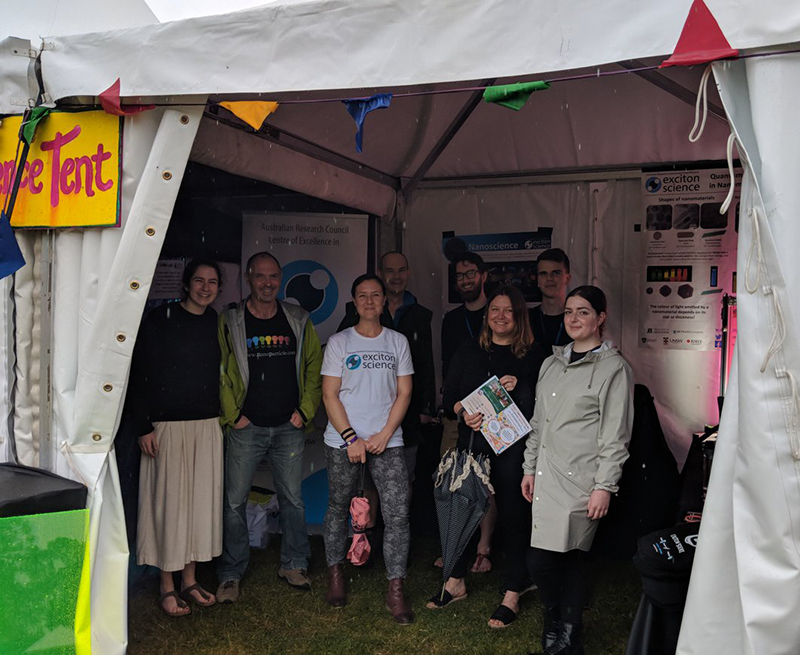
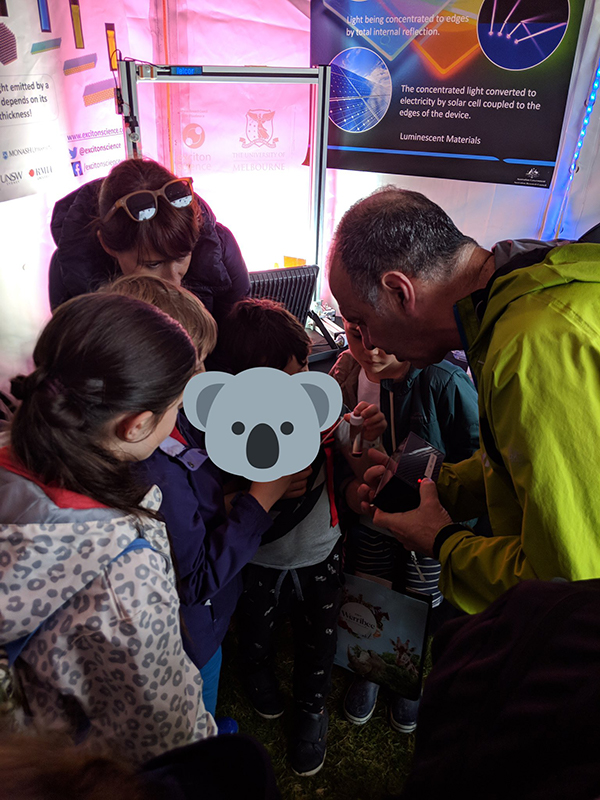
An eclectic group, including Exciton Science Chief Investigator Jared Cole from RMIT, gathered for a competitive night of science hilarity for the 2019 ‘Science Says!’ Hosted by SBS’s Dr Joel Gilmore, Jared was among six scientists battling for comedic glory. Teams of three competed to explain and express scientific ideas in a creative manner. Held in November, the evening was a great success, with laughs resonating out of the windows of the Victorian Royal Society building on Melbourne’s La Trobe Street.
To celebrate the year of the periodic table, The University of Sydney hosted an ensemble of quick-witted scientists to explore the tales of the elements. Hosted in the Great Hall, ‘The Al – Zr of the Periodic Table' event featured Dr Girish Lakhwani as the expert in charge of informing audiences about the importance of heavy metals Lead and Cadmium. Girish used this opportunity not only to promote the important work of our centre, but also to entertain and amuse audiences.
Each year, The University of Melbourne runs a science festival during National Science Week, with several events for the community and public. The Nano Science Lab swung its doors open to audiences to visit and observe reactions in action. Dr Nicholas Kirkwood led 60+ students and teachers through the new UniMelb lab and provided an excellent explanation of the team’s research and the consequent technological applications while providing an engaging and hands-on experimental experience for the lab visitors.
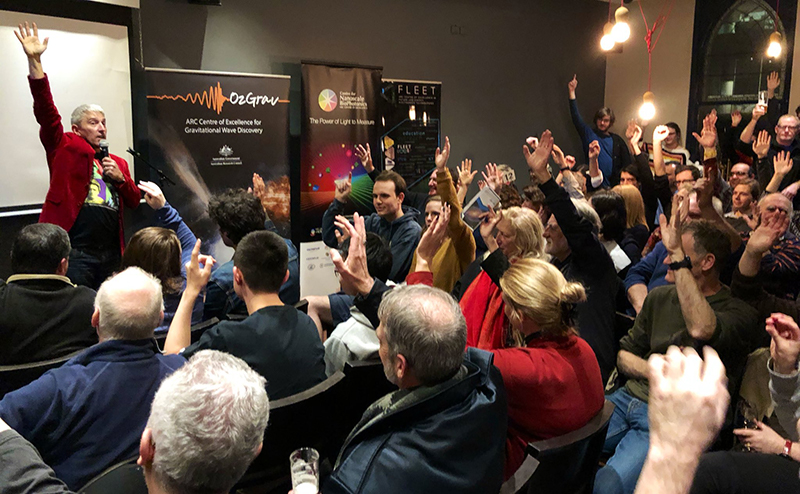
Physics in the Pub
The 2019 Physics in the Pub event was co-hosted by The Australian Institute of Physics along with ARC Centres of Excellence - Exciton Science, Oz Grav, CNBPS and FLEET. The evening was a mid-winter, beer-lubricated showcase of eight-minute physics talks in a totally free form which proved without a doubt that physics is not boring. A shining star among the physicists was RMIT and Exciton Science Chief investigator Jared Cole with his presentation on the measurement and definition of time
Sydney’s Vivid festival held in June in the largest festival of light, music and ideas in the southern hemisphere. As a part of the festival, the Museum of Contemporary Art hosted Light Collide, an ideas exchange forum. This illuminating event collected together researchers, innovators, start-ups and industry representatives including UNSW and Exciton Science Chief Investigator Dane McCamey to discuss how light and energy can be used and transformed in innovative ways.
Laneway Learning hosts approachable, fun classes in ‘anything and everything’. Dr Siobhan Bradley from the Ultrafast and Microspectroscopy Laboratories at The University of Melbourne hosted a talk titled The lowdown on renewable energy at Madame Brussels’ rooftop bar in Melbourne. She spoke to a group of adult learners about various types of renewable energy with a focus on solar energy capture.
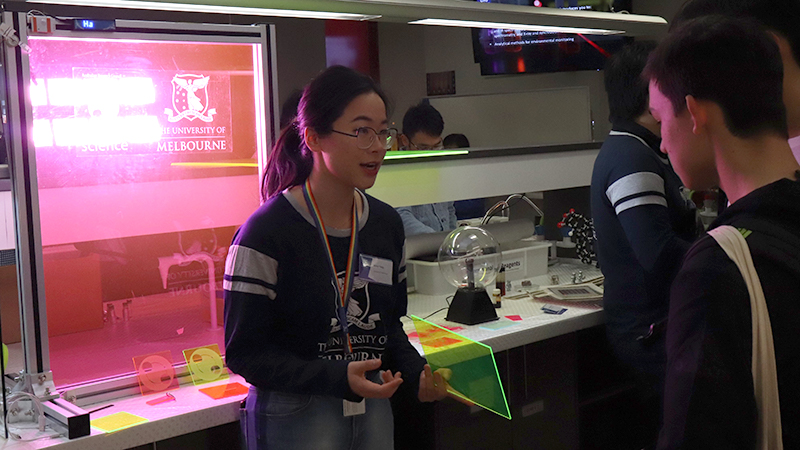
Masters student Hanbo Yang at UniMelb Open Day
Across multiple nodes, universityopen days saw large teams of our PhD candidates, post-doctoral researchers and chief investigators host laboratory tours and showcase sessions for prospective students. This year, the large luminescent solar concentrator demonstrator developed by Dr Wallace Wong and PhD candidate Bolong Zhang was a spectacle for families visiting The University of Melbourne. At The University of Sydney, visitors were treated to a demonstration of a single-photon counting measurement and Monash University guests learnt about low-cost perovskite solar cells.
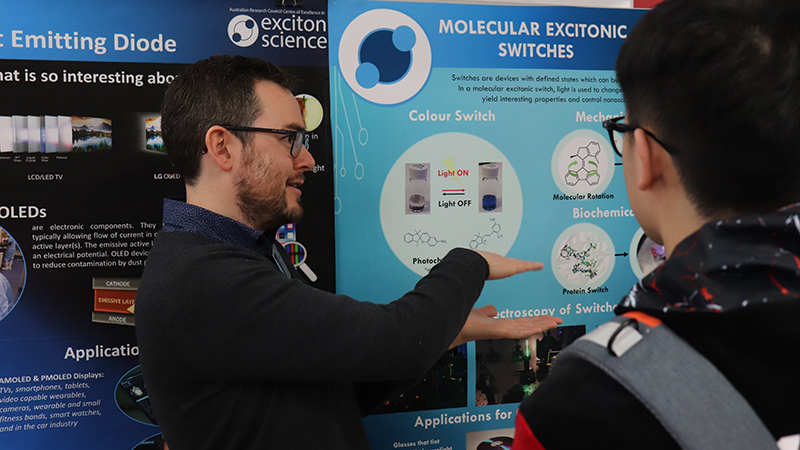
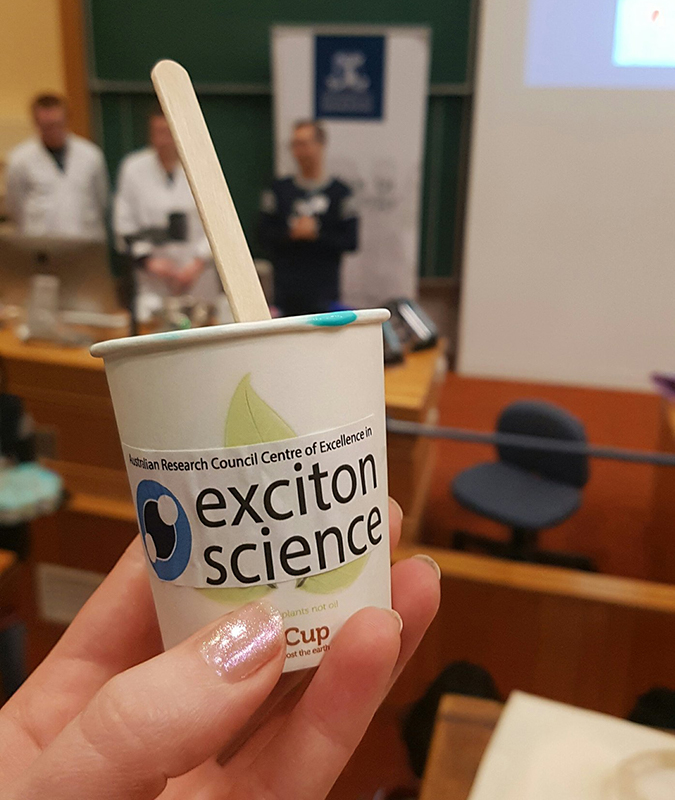
We have an energetic group of researchers across our nodes that are always enthused when it comes to outreach with the young scientists of tomorrow. As a result, 2019 saw Exciton Science members attending and leading school events, hosting students in their labs and supporting teachers in their delivery of key scientific concepts. In 2019, Exciton Science Researchers visited 23 schools across Australia and reached over 1200 secondary school students, 55 primary school students and 180 undergraduate students in Australia and China.
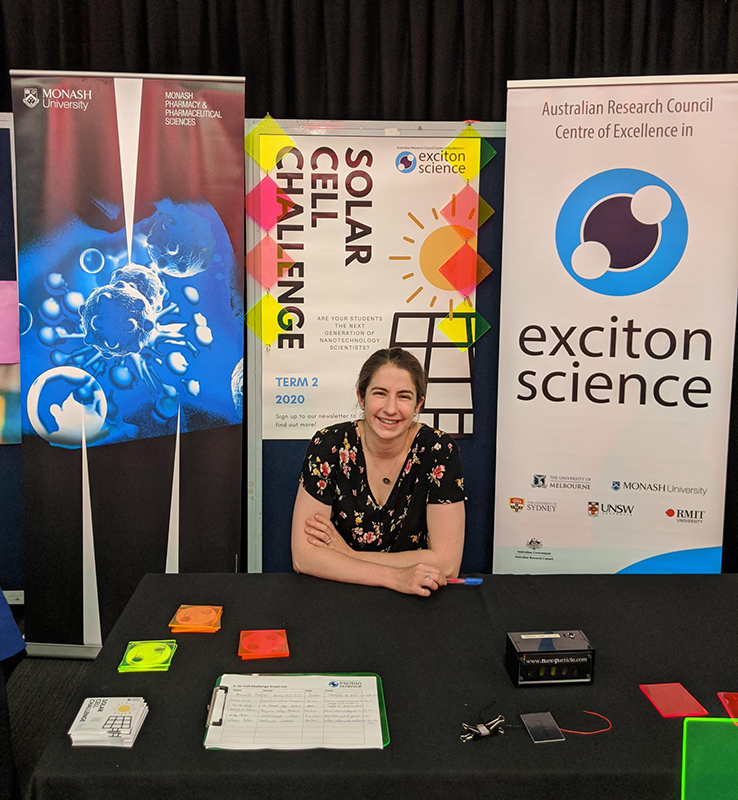
Outreach Officer Jasmine Lynch all ready for STAVCON
In the lead up to the launch of the 2020 Solar Cell Challenge, Outreach Officer Jasmine Lynch represented Exciton Science at the November Science Teacher Association of Victoria conference hosted at La Trobe University. Teachers were excited to learn about the experimental competition for secondary students. With more than 20 teachers signed up to find out more, it was a busy day of science education collaboration.
Chief investigator Alison Funston along with post-doctoral researcher Dr Laszlo Frazer represented the Monash University node of Exciton Science at the Keysborough Secondary College careers day. They presented to 250 Year 11 and 12 students about career pathways into scientific research and ways that students can contribute their keen scientific skills to a renewable energy future.
The Academy of Sport, Health and Education (ASHE) is a program hosted at the University of Melbourne. ASHE uses participation in sport to engage students, particularly indigenous students, in education and training in a trusted, culturally appropriate environment. As a part of this program, a group of 25 students in late secondary school year levels visited the Nanoscience Laboratory and heard from Post doctorate researcher Nicholas Kirkwood. The emphasis of the talk was on the real-world applications of the Exciton Science team’s work, including solar technology and nanotechnology. Nick observed that students were particularly engaged and asked many questions.
Dr Andrew Tilly from the Bio21 lab at the University of Melbourne hosted a group of students from the Melbourne Schools Partnership international program for a talk about how to make any surface solar. This program brings together international students in Year 11 from schools across Melbourne to experience life at University and learn about career prospects in science.
Along with Dr Anu Gulur Srinivas, Andrew also represented Bio21 at the University work experience program for Year 10 students in the winter holidays. They ran a practical demonstration on how to measure solar cell efficiency. Their work contributed to a highly engaging and informative program for students.
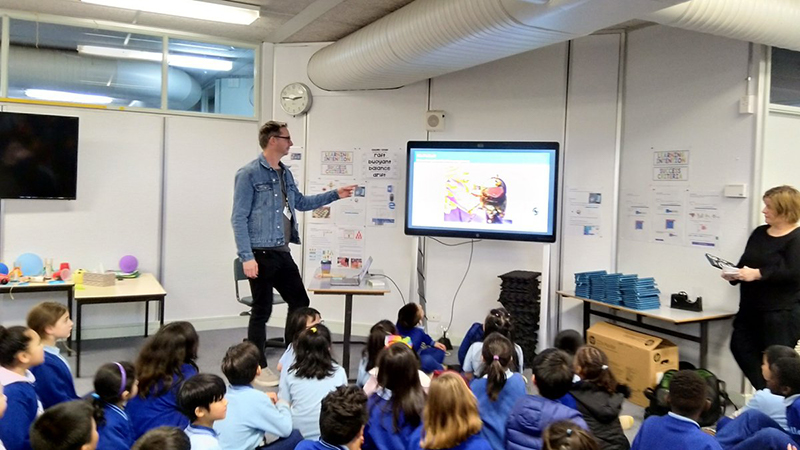

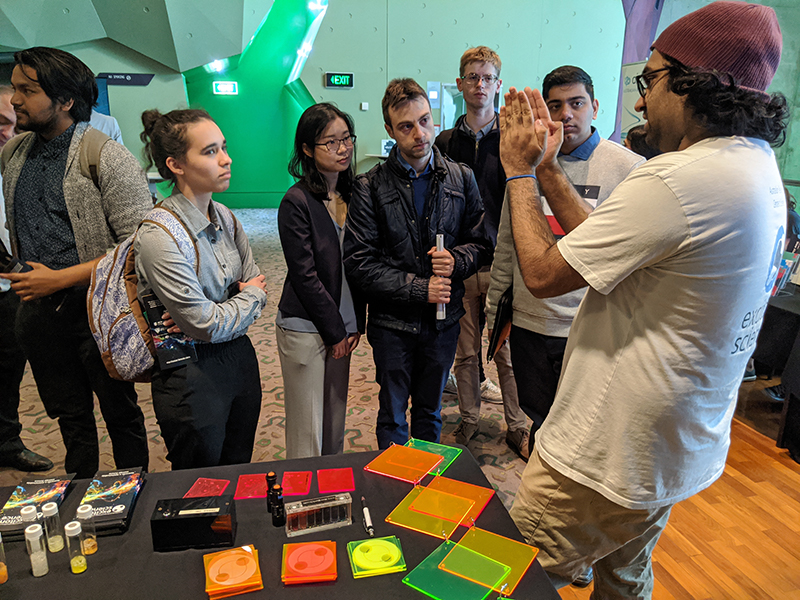
PhD student Anjay Manian speaks to students about where a degree in Physics can take you
The Australian Institute of Physics held its 2019 summer meeting at RMIT University in December. To kick-off the program, a job-fair for Undergraduate Physics students was hosted at the RMIT city campus. Exciton Science had a colorful exhibit on display and our team of post-graduate and PhD candidate representatives from the RMIT Exciton Science team were flat-out. With many excited students, questions and discussions about excitons, luminescent solar concentrators and complex quantum mechanic systems were bounced between physicists.
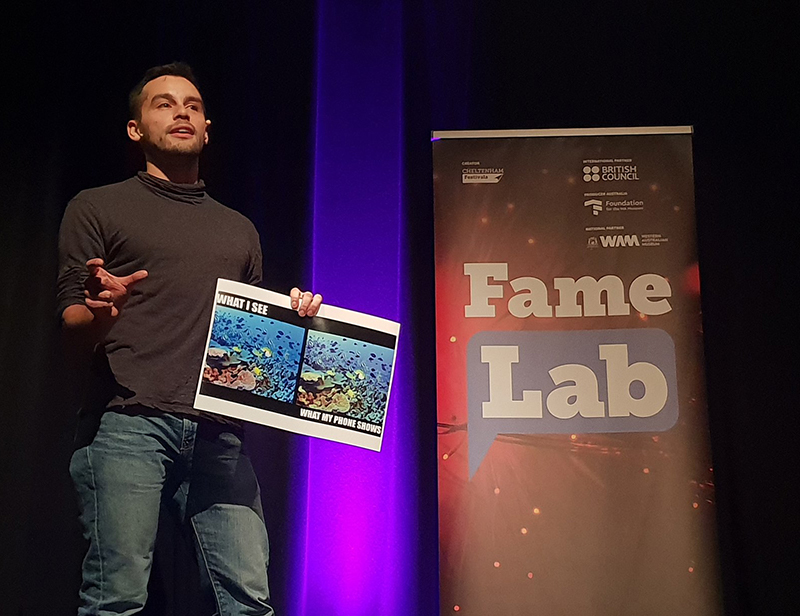
PhD Student Christian Blauth presents at FameLab
In 2019 Exciton Science PhD students Debora Monego and Christian Blauth competed in FameLab, making it to the semi-finals. FameLab is the world’s leading science communication competition aiming to find, develop and mentor young science and engineering communicators.
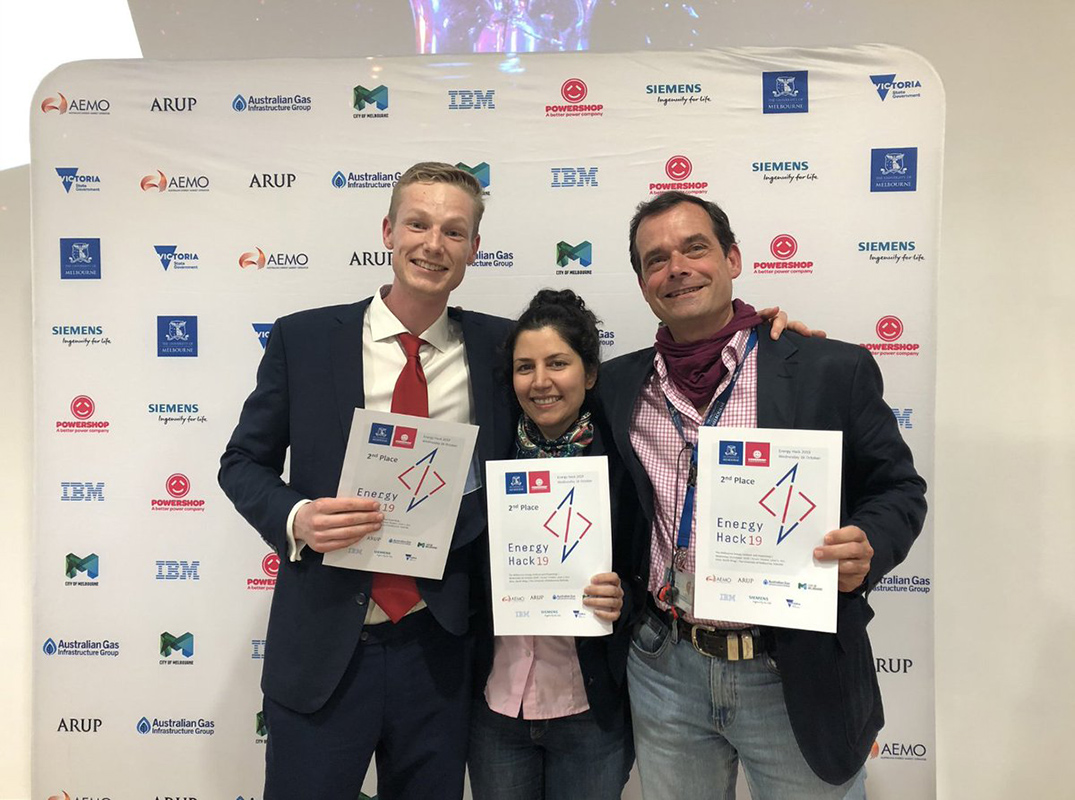
Research Fellow Pegah Maasoumi with her team at Energy Hack 2019
In October Research Fellow and new Associate Investigator Pegah Maasoumi and her colleagues were awarded second prize in the Melbourne Energy Institute 2019 Energy Hack competition with their board game, teaching all ages about the ins and outs of the energy system and helping to create a sustainable future for all. The team won $10,000 to develop the game further.
The Centre as a member of Science and Technology Australia has regular involvement in providing submissions to the peak body’s Board Meetings and their Annual General Meeting throughout 2019.
The Centre’s researchers have also been involved in a number of other briefings and meetings with government in Australia and internationally.
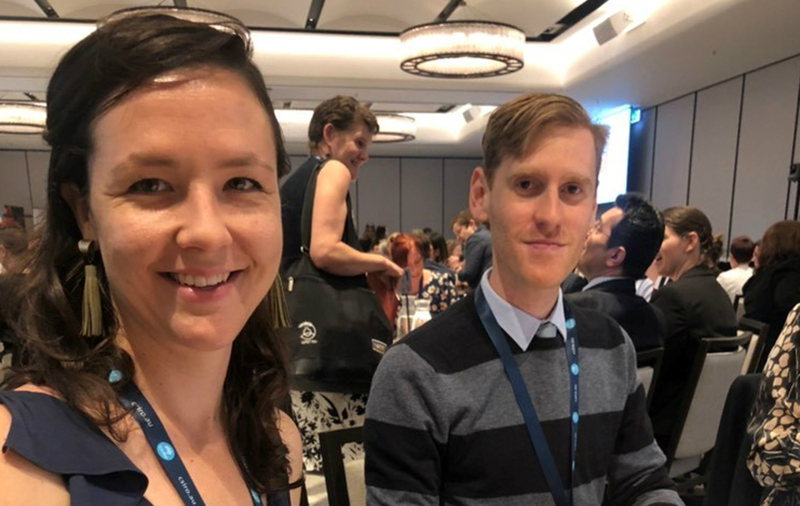
Research Fellows Siobhan Bradley and Kevin Rietwyk at Science Meets Parliament 2019
In November 2019 COO Kate Lowry, and Research Fellows Siobhan Bradley and Kevin Rietwyk attended Science Meets Parliament in Canberra for Science in Technology Australia’s annual event. The trio undertook a day of training on how to communicate the Centre’s science in a three-minute elevator pitch, talk to politicians and the media and hone the message of the Centre, before heading to Parliament House for a Gala Dinner in the Great Hall. Minister for Science, the Hon Karen Andrews, and Shadow Minister for Science Brendan O’Connor addressed the dinner, discussing the potential and challenges for integrating science into the national agenda. The second day took place in Parliament House as attendees were escorted through the halls of Parliament to meet with their designated MPs. A luncheon held at the National Press Club heard from Astrophysicist Lisa Kewley-Smith on bringing up the next generation of female scientists.
In February, Chief Investigator Ken Ghiggio met with the Prof Hansjorg Dittus and his colleagues from DLR (Deutsches Zentrum für Luft und Raumfahrt) the German Space Agency, and Victorian State Govt. representatives including Amanda Caples, Victoria's Lead Scientist, and discussed the scope and programs in Exciton Science to seek potential collaborative opportunities.
China Matters seeks to provide nuanced assessment of the relationship between research institutions and the People’s Republic of China to the Australian government, businesses and non-governmental institutions.
Research Fellow Eser Akinoglu attended the China Matters Workshop on "The state of science and tech policy in the People's Republic of China (PRC) - and overseas research collaboration" in May, providing a briefing on China experiences and current challenges for research collaboration.
In October Centre Director Paul Mulvaney gave a confidential briefing to the China-Matters Think Tank on the influence of the current China-US tariff and trade conflict on Australia's role in China. The discussion surrounded the potential adverse effects of poor Chinese economic performance on the flow of Chinese students to Australia.
In October PhD Student Benjamin Tadgell was invited for a meeting with MP for the seat of Wills, Peter Khalil, following a letter Ben wrote outlining his concerns about the Government's energy policy. Peter and Ben discussed what each thought were the most important technologies to invest in – in particular solar energy and more specifically green hydrogen.